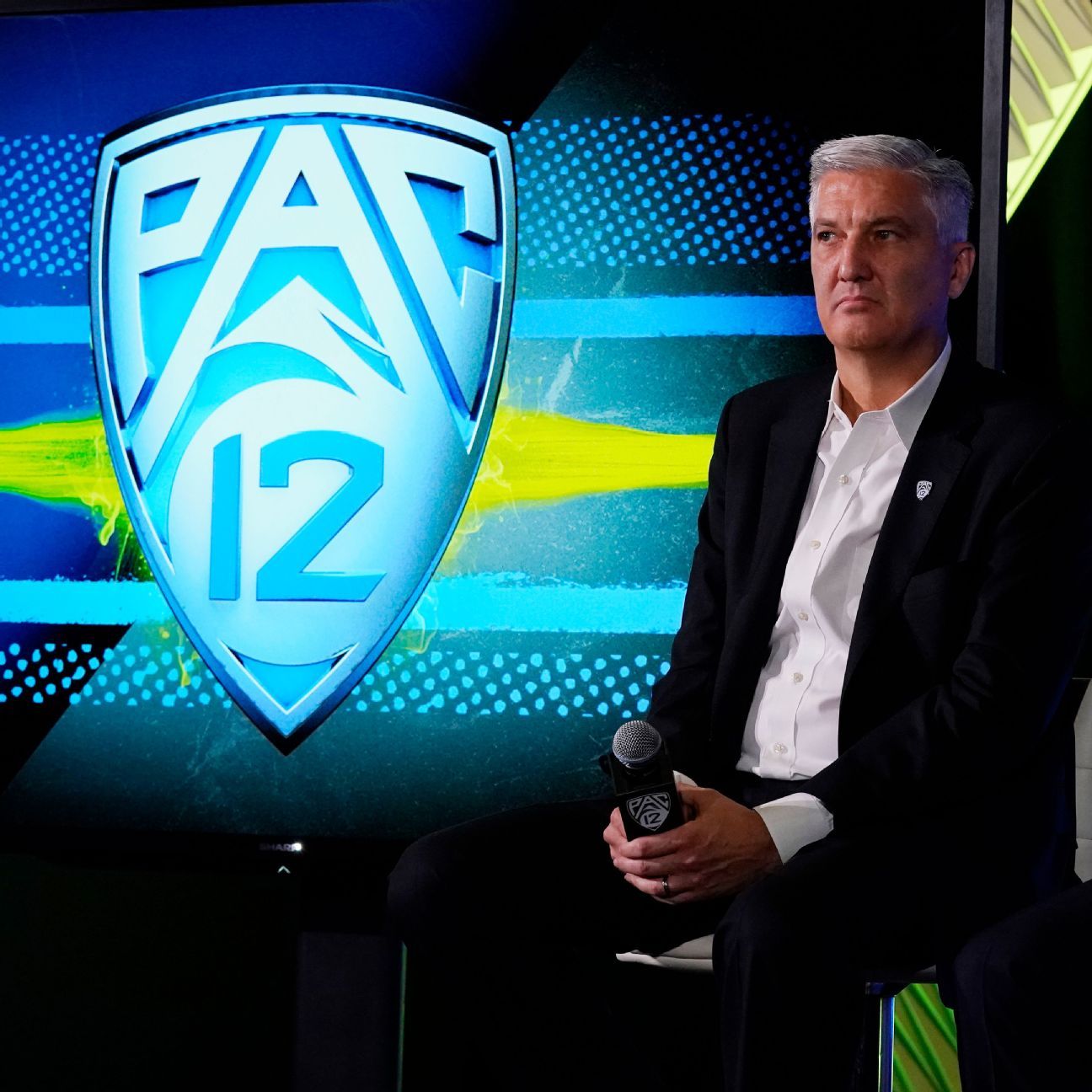LOS ANGELES — After weeks of speculation about the future of the Pac-12 in the wake of decisions from USC and UCLA to leave for the Big Ten, conference commissioner George Kliavkoff hit back at the assertion the league is on unstable ground.
“We are bullish about the Pac-12’s future and our opportunities for long-term growth, stability and success,” Kliavkoff said at Pac-12 media day Friday. “Our conference boasts 10 of the most iconic and innovative brands in all of sports, all-around excellence in academics and athletics and a half-dozen of the most valuable markets in this country.”
Several of the remaining Pac-12 schools have been mentioned as possible expansion targets for the Big Ten and Big 12, and comments from both conference commissioners have only fueled the idea. Asked about potentially adding Pac-12 schools earlier this month, the Big 12’s Brett Yormark said the conference is “open for business.”
That didn’t sit well with Kliavkoff, who pointed to the unspecified projected value of the Pac-12 media rights compared to the Big 12 and dismissed the idea that the Big 12 is a more desirable location.
“With respect to the Big 12 being ‘open for business,'” Kliavkoff said, “I appreciate that. We haven’t decided if we’re going shopping there yet or not.”
Kliavkoff’s jab came during a question-and-answer session in which he spoke of his desire for more collegiality among his peers. But he also wasn’t about to let what was being said elsewhere go unanswered.
“I’ve been spending four weeks trying to defend against grenades that have been lobbed in from every corner of the Big 12, trying to destabilize our remaining conference,” Kliavkoff said. “And I understand why they’re doing it. When you look at the relative media value between the two conferences, I get it. I get why they’re scared. I get why they’re trying to destabilize us, but I was just tired of that.”
Kliavkoff said the Pac-12 is actively exploring expansion opportunities and has prioritized “media value, athletic strength, academic and cultural fit and geography” for possible additions.
He didn’t identify any specific schools, but given the criteria laid out, San Diego State appears to be the most likely school the conference would target.
“Southern California is really important to us, and I think there are different ways of approaching staying part of Southern California,” Kliavkoff said. “We may end up playing a lot of football games in L.A.”
The Pac-12 is in an exclusive 30-day negotiating window with existing media partners ESPN and Fox about its next media rights deal, but Kliavkoff doesn’t anticipate anything to be finalized for at least a couple months. The most likely scenario is the conference’s Tier 1 football rights will remain on linear television, while another piece will be sold to a digital partner such as Amazon or Apple. The future of the Pac-12 Network after the next two seasons is unclear.
Kliavkoff told ESPN he is “very confident” the Pac-12 would be solidly in the middle of the Power 5 conferences on a per-school distribution basis but was unwilling to share what range he expects that to be worth.
UCLA and USC announced June 30 that they would leave for the Big Ten in 2024 after roughly a century as integral members of what eventually became known as the Pac-12.
Kliavkoff said the conference was “very disappointed” by USC and UCLA’s impending departures.
“That said, USC and UCLA have been proud members of the Pac-12 for almost a century, despite their decision,” he said. “We cherish our relationship with their student-athletes, coaches, staff, faculty, alumni and fans. For that reason, I personally instructed everyone at our conference to make sure that USC and UCLA student-athletes are given every opportunity to compete and succeed for as long as they remain in the Pac-12.”
Asked about the possibility the schools could reverse course and remain in the Pac-12, Kliavkoff did not rule that out for UCLA, which has faced public criticism from California Gov. Gavin Newsom for its handling of the defection.
“I’d say UCLA is in really difficult position,” Kliavkoff said. “There are a lot of constituents related to UCLA who are very, very, very unhappy with the decision. Student-athletes, the families of student-athletes, the faculty, the staff, politicians, the fans, the alumni, there’s a lot of really, really upset people with that decision and there’s a hearing coming up [with the UC board of regents] about that decision.
“I can’t give you a percentage chance. I think it’s unlikely, but if they came back, we would welcome them back.”
In his media session Friday, Arizona State head coach Herm Edwards also spoke to the matter of the changing nature of the Pac-12 and college athletics itself, noting how the landscape’s very model is undergoing a major shift, something he attributes to the significant power of television money.
“How can your conference generate money? Television,” he said, adding that greater television revenue is “going to help you provide for your student-athlete.”
“You’d have to provide not just a scholarship,” he continued. “It’s a little bit more than whatever that may be. … You’re gonna have to do that. And how do you do it? You have to generate money.”
Also on Friday, the Los Angeles Times reported that USC president Carol Folt ‘shut down’ potential Pac-12 expansion plans during a call with Pac-12 university presidents and athletic directors last year.
ESPN’s Paolo Uggetti contributed to this report.
